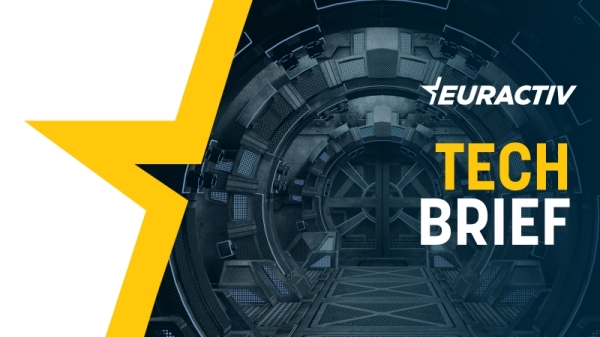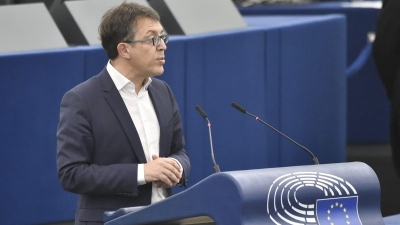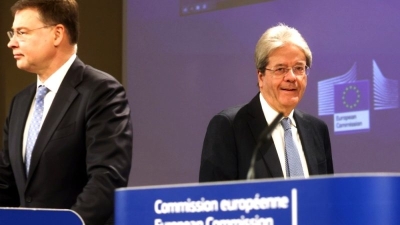Tech Brief: TTC4 agenda, B2G data-sharing

“We are committed to continuing to make full use of this cooperation forum to deepen the transatlantic partnership to respond to the challenges before us.”
Story of the week: The fourth summit of the EU-US Trade and Technology Council (TTC), scheduled for the end of this month, intends to steam off concerns about a subsidy race in the field of green tech and semiconductors, according to an early draft of the joint conclusions shared this week with the EU Council for input. The two blocs plan to align on electric vehicles’ plugs and critical minerals and launch a transatlantic circular economy initiative. Emerging technologies like the new risks associated with AI foundation models like ChatGPT and mutual access to research programmes on quantum computing are also on the agenda. Export control measures are another big chapter, with the EU falling in line with the US in its attempt to cripple China’s growing technological capacity (with good rest of Macron’s third way doctrine). In turn, Brussels seems determined to obtain Washington’s endorsement for its platform regulation rules, notably the DSA. Read more.
Don’t miss: Key questions remain for the portion of the Data Act that deals with business-to-government data sharing, according to an update seen by EURACTIV and shared with national representatives by the Swedish EU Council Presidency this week. The chapter is the most advanced in the trilogue negotiations, and although it is largely agreed upon, a few critical points need to be addressed at the technical level, namely the issue of which type of data public bodies can request, the micro and small enterprises exemption, the recovery from public emergencies and the inclusion of EU bodies. Meanwhile, the technical work continues in parallel with the ITRE committee currently explaining its approach to B2B and B2C data sharing, and with IMCO and JURI on cloud and trade secrets, respectively. Read more.
- Internal documents of the Commission revealed that the provisions to access open source in the AI Act were narrowed down due to existing trade commitments.
- The EU executive presented its recommendation to fight online piracy of live events, with a minor concession for rightsholders.
- A European Court of Justice’s long-awaited ruling on compensation for data protection breaches has left key legal questions unanswered.
- French national lawmakers presented an anti-Airbnb proposal.
- A new Council text on the Product Liability Directive specifies the national liability conditions for unknowable defects.
- Sworn enemies have joined forces to fight against the senders-pay proposal.
Before we start: If you just can’t get enough of tech analysis, tune in to our weekly podcast.

The first five years of the GDPR
Andrea Jelinek is the first Chair of the European Data Protection Board. We discussed with her the first five years of GDPR enforcement, the progress that still needs to be done and the challenges posed by AI like ChatGPT.
Artificial Intelligence
Source code not available. Internal Commission documents obtained by an academic via a freedom of information request have revealed that the capacity for public authorities and auditors to access AI source code was restricted in the AI Act proposal based on a commitment in the EU-UK trade agreement. The documents show that provisions related to source code disclosures were narrowed down, and described as a concerning development by the law professor who shared them. Read more.
Timeline confirmed (for the moment). The final technical meetings to discuss the recitals of the AI Act took place in the European Parliament this week. On Thursday, things got tense, with the EPP calling for a postponement of the committee vote. The centre-right group wants to table split votes on the biometric identification bans, both real-time and ex-post, but a creative solution needs to be found as the committee procedures do not really allow for that. The EPP has been trying to buy time to solve its internal politics with its strong law enforcement faction. Still, the co-rapporteurs were adamant about sticking to the 11 May date which was confirmed ‘for the moment’, an EP official told EURACTIV.
Regulators on ‘vigilant’ mode. US officials met with representatives of tech companies such as Google, Microsoft, and OpenAI this week to discuss AI’s rapid development and potential risks. Ahead of the meeting, the head of the US Federal Trade Commission, Lina Khan, warned in the New York Times that regulators needed to remain vigilant to the possible harms of the tech. Following the gathering on Thursday, the White House announced a range of measures intended to address these, including investment in new national AI research centres.
CMA on AI. The UK’s Competition and Markets Authority (CMA) has announced a review of the AI sector amid increasing concerns over its potential impacts. The watchdog will examine the implications of models such as ChatGPT on competition and consumer protection and will produce a set of guiding principles to safeguard these areas as the tech development continues. A report on the CMA’s findings will be published in September.
Exaggerated discovery? Researchers at the University of Texas say they have developed a new AI system capable of translating brain activity, such as listening to or silently telling a story, into a continuous stream of text. However, the AI model was much more specific than the headlines would suggest.
Demand copyright, receive invoice. A German photographer whose work was used in a dataset used to train AI image-generation models such as Stability AI was hit with a $979 bill for damages after he asked for his photos to be removed.
Hollywood on strike. Hollywood writers began a major strike this week, with the influence of AI on the industry among their concerns. Read more.
Competition
Why not profit from it. Seeking to avoid an antitrust investigation by Brussels, Microsoft has reportedly offered to sell its Office product at different prices based on whether or not it includes the Teams app. The move comes in response to a complaint from workplace platform Slack that the tech giant had unfairly bundled the two products, though the Commission said this week that other complaints of a similar nature had been received.
Moving ahead of DMA. France’s antitrust authority has issued precautionary measures against Meta related to its conduct in the ad verification sector. The watchdog found that Meta’s viewability and brand safety partnerships likely constitute an abuse of the company’s dominant position and calls on the company to establish new objective, transparent and non-discriminatory criteria for assessing these partnerships.
Experienced or biased? Some competition practitioners welcomed the appointment of professor Fiona Scott Morton as the Commission’s chief competition economist on Twitter last week, but they consequently deleted the tweets as the appointment is yet to be confirmed. Part of the industry considers her ‘sensible and fair-minded’, as her experience includes working with Big Tech companies. For the same reason, some NGOs and think tanks have expressed concerns over potential conflicts of interest which they say could pose issues in her handling of cases concerning big tech companies.
Digital design merger. The UK’s Competition and Markets Authority (CMA) has launched an antitrust investigation into Adobe’s acquisition of the design tool Figma. Invitation to comment is open until 18 May, with the watchdog set to conclude phase 1 of the enquiry and decide whether to initiate a full investigation by 30 June.
Copyright
See you in 2.5 years. The Commission has released its recommendation on combatting piracy of live events, eliciting criticism from stakeholders who had already voiced their concerns that the non-binding nature of the initiative would fall short of what is required to address the issue. Earlier this week, 24 MEPs also wrote to Commission President Ursula von der Leyen to express similar worries. The final recommendation focuses on three main areas: prompt treatment of notices, dynamic injunctions and commercial offers and awareness, as well as better cooperation between national authorities, rightsholders, and intermediary service providers. The only concession made to rightsholders was a slight shortening of the review deadline from three to two years and a half. Read more.
Cybersecurity
Gap keeps growing. The cyber skills gap is growing faster than it is being filled, and Europe is lagging behind globally, according to a report by cybersecurity organisation (ISC)². The analysis found that demand for professionals with cybersecurity skills is accelerating far quicker than the workforce, with Europe, the Middle East and Africa displaying the greatest increase in the cyber talent gap worldwide. For Europe, things are made worse by the need for companies to keep up with new regulatory requirements. Read more.
Data & Privacy
Many questions unanswered. A ‘mere infringement’ of EU data protection rules is not enough to claim compensation, according to a ruling issued by the European Court of Justice this week. In response to a case brought by a claimant whose data had been processed by the Austrian Postal Service to determine their political affiliation for targeted political advertising, the Court examined the conditions under which damage caused by GDPR infringements could be deemed serious enough to warrant compensation. The ECJ rejected the Advocate General’s concept of a ‘threshold of seriousness’, which many considered difficult to determine, but sent the ball back to the national courts to define the airy notion of non-material damage. Read more.
Health data is no joke. While the vast majority of people are using digital health platforms, consumers are very cautious and selective when it comes to sharing their health data, a survey by the European Consumers Organisation has found. Large majorities are unwilling to share data related to, for instance, genetics or sexual and reproductive health, and only half of the respondents said they were willing to share their data with healthcare practitioners across EU member states in order to receive good treatment when travelling abroad.
Change of odds? The race for the next chair of the European Data Protection Board might be more open than expected, EURACTIV has learned. Some say the odds are now in favour of the Dutch candidate Aleid Wolfsen as the Finn Anu Tallus did not fully convince her peers during the hustings.
Digital Markets Act
Timeline reminder. The Digital Markets Act (DMA) entered into application on Tuesday. Potential gatekeepers now have until 3 July to notify the Commission of their core platform services. The EU executive will then have until 6 September to decide whether they should be designated as such. If they are given this classification, the platforms will have until 6 March 2024 to comply with the DMA’s obligations.
Disinformation
EDMO’s anti-disinfo training. The European Digital Media Observatory will offer training on EU policy to tackle disinformation next week, covering recent developments in the field, including relevant initiatives such as the DSA, Code of Practice on Disinformation and the Media Freedom Act. The training will be held online and targeted at stakeholders, including fact-checkers, policymakers, journalists and those from civil society.
eGovernance
Trilogue stalemate. The European Digital Identity file is proceeding extremely slowly, and everyone now expects the Spanish presidency to take over the file. The Parliament is growing frustrated at the Swedish Council presidency, which does not seem to consider the eIDs a priority and, at times, even fails to explain the Council’s position. Although political guidance would be needed to make some progress, the Swedes are keeping the rest of their colleagues in the dark, with some attachés reaching out to MEPs for updates. The discussions have so far concentrated on the wallet, relying parties and governance, but only a few lines have been ‘greened’. The issue of the unique identifier is likely to be moved to the political level. Still, after last week’s trilogue was cancelled, there is no date yet for the next political meeting – although the end of May is the most likely option.
Gig economy
France’s anti-Airbnb proposal. Regulation of short-term holiday rentals should be tightened to combat over-tourism and poor housing conditions, several French parties said this week, stepping into a wider European debate on data collection by online platforms. Three MPs and a senator signed the “Let’s Regulate Airbnb” initiative, calling for action to address the issue, but contrary to the EU proposal, they focused on the issue of taxation and energy consumption. Read more.
Industrial strategy
Made in France chips. The Commission approved a French aid measure intended to give state aid to STMicroelectronics and GlobalFoundries for opening and operating a front-end semiconductor production facility in Crolles, intended to be up and running by 2027. The total investment is worth €7.4 billion.
Speaking of Germany. Semiconductor production is geopolitically vital to strengthen the region’s supply chains, Commission President Ursula von der Leyen said this week at the opening of a new chip manufacturing plant in Dresden. The German Commission president welcomed the launch of the plant, which will be operated by Infineon Technologies and is set to be operational by 2026.
Media
Media freedom is a mixed bag. Disparities in press freedom between EU states have decreased since last year but key issues remain, according to Reporters Without Borders (RSF) 2023 Press Freedom Index, released this week. The rankings show improvement amongst many eastern European countries, and RSF notes ‘unprecedented’ action on media legislation at the EU level. The organisation’s report also focuses on the impact of the war against Ukraine and how the growing fake content industry is affecting the press worldwide. Read more.
Draft report under attack. Germany’s “yellow press” is attempting to shape the Media Freedom Act and is being aided by the European Parliament’s rapporteur on the file in doing so, Renate Schroeder, President of the European Federation of Journalists, told a conference in Brussels this week. Schroeder also told the audience that the rapporteur, Sabine Verheyen, had not made enough time for civil society organisations, giving more space in hearings to publishers and lawyers than journalists. NGOs join journalists’ representatives in voicing their concerns on the draft report. Read more.
Respect our sources. Representatives of media organisations, including broadcasters, publishers and journalists, have written to member states to emphasise the importance of the European Media Freedom Act’s provisions of protecting journalists’ sources, criticising the draft proposal as insufficient and even a step backwards in this regard.
Platforms
3rd pol ads trilogue. The third trilogue on political ads will be held today, focused on the targeting and amplification of content, notably in terms of scope, restrictions and role of the European Data Protection Board. Also up for discussion are record-keeping and retention and unlawful political advertisement. The agenda is extremely ambitious and the scope issue is, as usual for this file, a major hurdle for the co-legislators to agree on.
Ready to push back. MEP Paul Tang, a member of the Parliament’s Tracking-Free Ads Coalition, wrote to colleagues this week ahead of the trilogue to raise concerns about the Council’s approach to the issue. The Dutch lawmaker is concerned that protections on targeting based on sensitive personal data will be watered down if the Council gets its way.
Content moderators, unite! A meeting in Nairobi this week saw 200 Kenya-based content moderators working in 14 languages for platforms such as Facebook, YouTube, TikTok, and ChatGPT gathered to form a labour union to lobby for improved working conditions. The move follows an unfair dismissal lawsuit filed in the country by 184 Facebook moderators who Meta fired in January.
Twitter’s daily tweaks. Twitter has enacted a number of changes to the open source code for its recommendation algorithm, with company owner Elon Musk announcing major incoming software updates. Musk said in a tweet that among them would be an upgrade to Direct Messages, including allowing for their encryption.
I’ll see my way out. TikTok’s US head of trust and safety, Eric Han, will reportedly leave the company next week, as the company wards off a potential ban by the US government. In December, long-time TikTok executive Han was appointed leader of the company’s US Data Security a department specifically created to allay government concerns about the continued use of the app.
Rapporteur settled. IMCO’s own-initiative report on the metaverse was assigned to EPP MEP Pablo Arias Echeverría. The office of Andreas Schwab, who was previously said to be mulling rapporteruship of the file, denied that was ever the case.
Product liability
New PLD Council text. A new compromise text on the Product Liability Directive shared by the Swedish presidency has introduced conditions for national rules to extend liability on unknowable vulnerabilities and elaborates on the legislation’s scope. The document, which also covers the right to compensation, court cases, and the timeline for review, is on the agenda of the Civil Law Working Party today. Read more.
Telecom
From foes to allies. Civil society groups and telecom sector rightsholders have – unusually – joined forces in expressing concerns about the Commission’s senders-pay initiative to make large tech companies contribute to network infrastructure costs. In a joint statement published this week, the NGOs and rightsholders, who have been at each other’s throats over the Copyright Directive, put their differences aside to voice worries about the initiative and the Commission’s ‘biased’ questionnaire, ranging from potential violations of the net neutrality principle to a possible scope creep. Read more.
GIA timeline. The European Parliament’s rapporteur for the Gigabit Infrastructure Act, Alin Mituța, plans to release its draft report on 14 June, putting it for consideration on 28 June. The idea is to reach the ITRE committee vote in mid-September, obtaining a mandate without the plenary vote. The rapporteur’s priorities are to keep the file as a regulation, resisting a Dutch-led push in the Council to make it a directive and improve the connectivity coverage for rural areas. As the plan is to finish the file before the end of the mandate, the Romanian MEP will also resist those trying to mix the proposal with the senders-pay debate.
Open Internet update. The Commission has published its second report on implementing the Regulation on Open Internet Access. It confirms that the initiative continues to guarantee a key balance between protecting end-users rights and supporting a competitive environment.
Transatlantic ties
Digital G7. Digital Ministers from around the globe gathered in Japan last weekend for the G7 Digital and Tech summit, with discussions covering subsea internet cables, digital infrastructure cybersecurity and dataflows safety. In the Ministerial Declaration published at the end of the two-day meeting, leaders set out several pledges, including commitments to address digital divides, facilitate cross-border data flows, promote secure and resilient digital infrastructure and cooperate on promoting responsible AI.
Artic cable feasibility. In a tweet during the G7, Commission EVP Margrethe Vestager referred to a subsea cable connecting Europe to Japan via Canada and the US. Since EURACTIV revealed the infrastructural project in October, the Commission launched a feasibility study assigned under the Northern EU Gateways to demonstrate the technical and financial viability of two submarine cables, Far North Fiber and C-Lion2, and Terrestrial Backbone Finland, as well as the connection with third countries through an Arctic Ocean Cable. The companies currently involved are the Finnish Cinia and Denmark’s Nordunet.
What else we’re reading this week:
Geoffrey Hinton tells us why he’s now scared of the tech he helped build (MIT Technology Review)
Quantum computing could break the internet. This is how (FT)
Read more with EURACTIV




